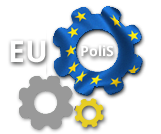Secondo seminario
Lunedì 23 marzo 2015 (ore 9.30-13) si è svolto il seminario dal titolo “La selezione delle élite politiche nell'Unione europea: la partecipazione della società civile". L’incontro è stato ospitato dal Dipartimento di Comunicazione e Ricerca sociale, di Sapienza Università di Roma, Aula Wolf, via Salaria 113, Roma.
Si è trattato del terzo degli appuntamenti organizzati nell’ambito del Progetto EUPoliS, "Partecipazione politica transnazionale, rappresentanza e sovranità nel progetto europeo", selezionato e cofinanziato dalla competente agenzia dell'UE, EACEA-Jean Monnet ad agosto 2014.
EUPoliS mira a promuovere la discussione e la riflessione sulle questioni relative all'Europa, migliorando la conoscenza dell'Unione e dei suoi processi in contesti specifici. Oltre a contribuire alla ricerca scientifica sui temi della integrazione europea, l’obiettivo del progetto è infatti quello di aumentare il senso di consapevolezza civica e politica di singoli ed associazioni, nell’ambito del sistema dei media, della formazione politica, delle professioni legali.
Ospiti dell’incontro sono stati: Pier Virgilio Dastoli, presidente del Consiglio Italiano del Movimento Europeo (CIME); Giuseppe Allegri, ricercatore e docente a contratto di Diritto pubblico presso Sapienza, Università di Roma; Pietro Adami, avvocato e membro dell'associazione Giuristi Democratici e Linda Manzone, dottore di ricerca in Scienze della comunicazione ed esperta in comunicazione istituzionale. Moderatrice del dibattito è stata Paola Marsocci, professoressa di Diritto costituzionale e responsabile del progetto EUPoliS.
Il seminario si è rivolto soprattutto a studenti, ricercarori e docenti, professionisti della comunicazione ed avvocati. Il nostro obiettivo è stato quello di discutere sulle forme di coinvolgimento e partecipazione dell’associazionismo civico nella determinazione dell’agenda politica comunitaria e di analizzare i temi emergenti e comuni promossi in tale ambito.
Dopo gli interventi, il dibattito è stato animato dalle domande del pubblico, composto da studenti, docenti e ricercatori, giornalisti e avvocati.
Gli atti saranno pubblicati in un volume.
LUNEDÌ 23 MARZO 2015
Dipartimento di Comunicazione e Ricerca Sociale - Aula Wolf - via Salaria, 113 Roma
L'incontro è stato accreditato dal Consiglio dell'Ordine degli Avvocati di Roma per n. 3 crediti formativi.
Audio del Secondo seminario del 23/03/2015
La selezione delle elite politiche nell'Unione Europea: la partecipazione della società civile by Radiosapienza on Mixcloud
EuPolis: Event, Participatory Democracy in the EU
“Strengthening the role of participatory democracy in Europe” was the focus of the third EuPolis Conference held on in Rome March 23, 2015. The project is coordinated by Sapienza University to promote the debate on active participation in Europe.
The event, entitled “Political Representation in the European Union Put to the Test by Euroscepticism,” kicked off Project EuPolis “Transnational Political Participation, Representation and Sovereignty within European Projects,” promoted by the Erasmus+ Programme, the Jean Monnet Programme and Sapienza University.
Pier Virgilio Dastoli, President of CIME, opened the event with a series of critical evaluations on the presumed stabilization of democratic legitimacy, following the ratification of the Treaty of Lisbon. On the one hand, the EU, Dastoli commented, has no European government sustained in a Parliament by a political majority that expresses a European scale programme. This is caused by the lack of a uniform electoral procedure and the existence of transnational political forces. On the other hand, the legislative initiative entrusted to European citizens has over time proven to be a complicated instrument to handle, and is neither very effective, nor sustained by a better form of consultation for civil society. Participatory democracy, President Dastoli explained, ought to be implemented in a manner that, during the European elections of 2019, citizens will be actually be able to choose what type of Union they wish to create.
Giuseppe Allegri, a researcher and political analyst, delved further into participatory democracy. He emphasised the importance of distinguishing between processes of ‘top-down’ consultation in an organized civil society (such as those enacted by the European Commission for the drafting of the white or green books or those used as basis for the work of the European Convention) and ‘bottom-up’ participatory processes that involve citizens through spontaneous initiatives. The latter approach, Allegri underlined, has hardly been applied although it should be more appraised, especially with the use of new technologies.
A ‘bottom-up’ example of participatory democracy is represented by the Giuristi Democratici Association, which, as lawyer Pietro Adami explained, has gradually (like many other citizen associations) been able to redeem itself from its subordination to political parties by counting on the voluntary commitment of its associates.
Sociologist Linda Manzone pointed out how in the last few years, the European Commission has demonstrated a certain sensibility for participatory processes, encouraging both ‘top-down’ initiatives, such as the Dialog with Citizens, and ‘bottom-up’ initiatives. The lack of procedural codes for participatory processes is still one of the barriers to understanding, measuring and evaluating their actual impact on decisional processes.
The event ended with a pubic debate amongst students, experts and representatives of civil associations.


